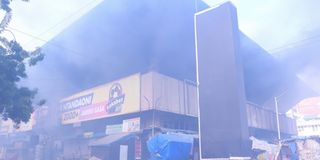
Dar es Salaam. President Samia Suluhu Hassan’s revelation that the 2021 fire at Kariakoo Market was deliberately set has raised serious questions regarding the incident and the government's handling of it.
These questions include: Who were the suspects? What actions have been taken against them? Why were their identities not disclosed? And why did it take the President’s statement to bring this to light?
The demand for answers has intensified, particularly concerning the individuals involved, the measures taken, and the confirmation of the President’s assertion that the fire was intended to destroy evidence.
The fire that ravaged Kariakoo Market occurred on July 10, 2021.
In response, the government allocated Sh28 billion to rebuild the market, with reconstruction commencing in January 2022 and completed last year.
However, the incident is part of a series of similar events that have caused distress among traders and Tanzanians.
Lingering questions
Before President Hassan pointed to those responsible, there had already been murmurs surrounding the findings of an investigation led by Prime Minister Kassim Majaliwa’s committee.
Speculation grew as the years passed without a report being made public, only for the issue to resurface following the President's comments.
While President Hassan provided an answer to a lingering question, many remain: Who are the individuals involved, and what legal actions have been taken against them? What were their motives?
A human resources and administration lecturer at the Tumaini University Dar es Salaam (Tudarco), Dr Lazaro Swai, stated that the President should have disclosed all relevant details given her authority.
Speaking to The Citizen’s sister newspaper Mwananchi on Thursday, January 31, 2025, Dr Swai suggested that if the President lacked sufficient information, she should have tasked state agencies with conducting investigations and releasing comprehensive findings.
“The questions persist because we don’t know if her statement was based on an investigation. If so, why hasn’t the report been made public?” he asked.
He further emphasised that, as the Head of State, she should have ensured all questions were answered or instructed the relevant authorities to clarify the situation.
Another pressing question is what will happen to the suspects if they are identified.
Legal implications
Legally, if suspects are identified and sufficient evidence is found, they could face criminal arson charges.
A lecturer of law at the University of Dar es Salaam (UDSM), Dr Idd Mandi, explained that arson falls under Section 319 of Tanzania’s Penal Code, which classifies it as a felony.
“The penalty for this offense is generally 30 years in prison if the suspect is proven guilty,” noted Dr Mandi.
He quoted the law, stating, “Anyone who intentionally sets fire to a building or vehicle, causing total or partial destruction, commits a criminal offence punishable by up to 30 years in jail.”
The traders’ losses
Further questions have arisen regarding the losses suffered by traders due to the fire. Will they be compensated, and if so, by whom?
Another concern is whether the President’s statement reflects the findings of the investigation.
If it does, why wasn’t the report made public when the investigative committee was first established?
The prolonged silence surrounding the investigation and the lack of updates on actions against the suspects have only deepened public scepticism.
Why has no official update been provided on the steps taken against those responsible?
To prevent traders and market officials from losing evidence again, as President Hassan claimed happened in 2021, robust systems for recording financial transactions must be established.
An economics lecturer at UDSM, Dr Gerald Kibira, pointed out that the destruction of evidence is more likely if financial records are maintained on paper.
“With digital record-keeping, no matter what burns, the data remains intact. The government must learn from this,” he said.
“Having a proper system for tracking revenue and expenses will help the government collect taxes efficiently while monitoring business activities at Kariakoo, which is considered the commercial hub of East Africa,” he added.
He warned that failure to implement such systems would leave room for individuals to commit financial crimes and easily erase evidence.
Dr Kibira also questioned why, four years later, the suspects remain unidentified and what progress has been made regarding the alleged embezzlement by traders or former market leaders.
Given the time that has passed, he stressed the importance of implementing solid measures to prevent another financial loss similar to the one in 2021.

